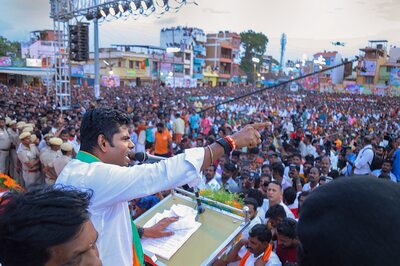
views
Kolkata or Calcutta as it was earlier called is a city of passionate people. Once known as the Second City of the Empire after London, Kolkata was also the centre of Renaissance. Today, centuries later, the people here are as passionate about life as they are about cinema. And the 24th edition of the Kolkata Festival's main venue at Nandan complex turns into a carnival of sorts during the eight days of cinema. And what is wonderful is the unbiased attitude of Kolkatans. Whether it is a Godard or a Ray or a contemporary director, young and fresh into the field, the crowds throng the auditoriums.
On Monday, Praveen Morchhale’s Urdu-language feature, Widow of Silence, screened to a packed hall with young boys and girls sitting on the steps and aisles. And the movie was gripping, even though it was a trifle too long. On a subject as disturbing as missing men in Kashmir, Morchhale’s work explores in all its pain and poignancy the angst and agony of a young woman, Aasiya, whose husband is picked up by security forces one night. Seven years pass, and nothing is heard of him, and Aasiya's desperate efforts to trace him are in vain. Finally, she plays her trump card by asking the District Collector for her husband's death certificate. He refuses, but later yields on condition she sleeps with him. Or, maybe, she can sell her house and give him a commission. Aasiya declines both and finds that she cannot get the certificate – leaving her completely in the dark about her husband. Is he alive or is he dead?
Widow of Silence, which premiered at the recent Busan International Film Festival, is Morchhale’s third creation. His first, Barefoot to Goa (2013) spoke about a brother and sister and their quest to bring home their estranged grandmother. The 2017 Walking With The Wind (which bagged three National Awards) follows a seven-year-old boy's journey through the Himalayas to fix his friend's broken chair – a film that reminded me of some Iranian movies.
Morchhale’s latest work is his most powerful and is a searing critique of the Government's unconcerned attitude towards those dozens of women whose husbands disappeared during Kashmir's armed struggle in the 1990s.
Shot in an unbelievably short budget of Rs 50 lakhs over 17 days in Kashmir's Dras region, the film has Shilpi Marwah, a Delhi theatre veteran, playing Aasiya. Morchhale says that “I needed a woman who would look like a Kashmiri, but whose face and eyes would convey both sadness and strength. Shilpi fit the bill.”
The most colourful performance came from Bilal, a real-life bus drive whose caustic humour is just amazing. When a soldier stops his van, the driver quips: “Don’t touch the flowers with your gun or the flowers may start loving it.”
(Gautaman Bhaskaran is an author, commentator and movie critic)




















Comments
0 comment